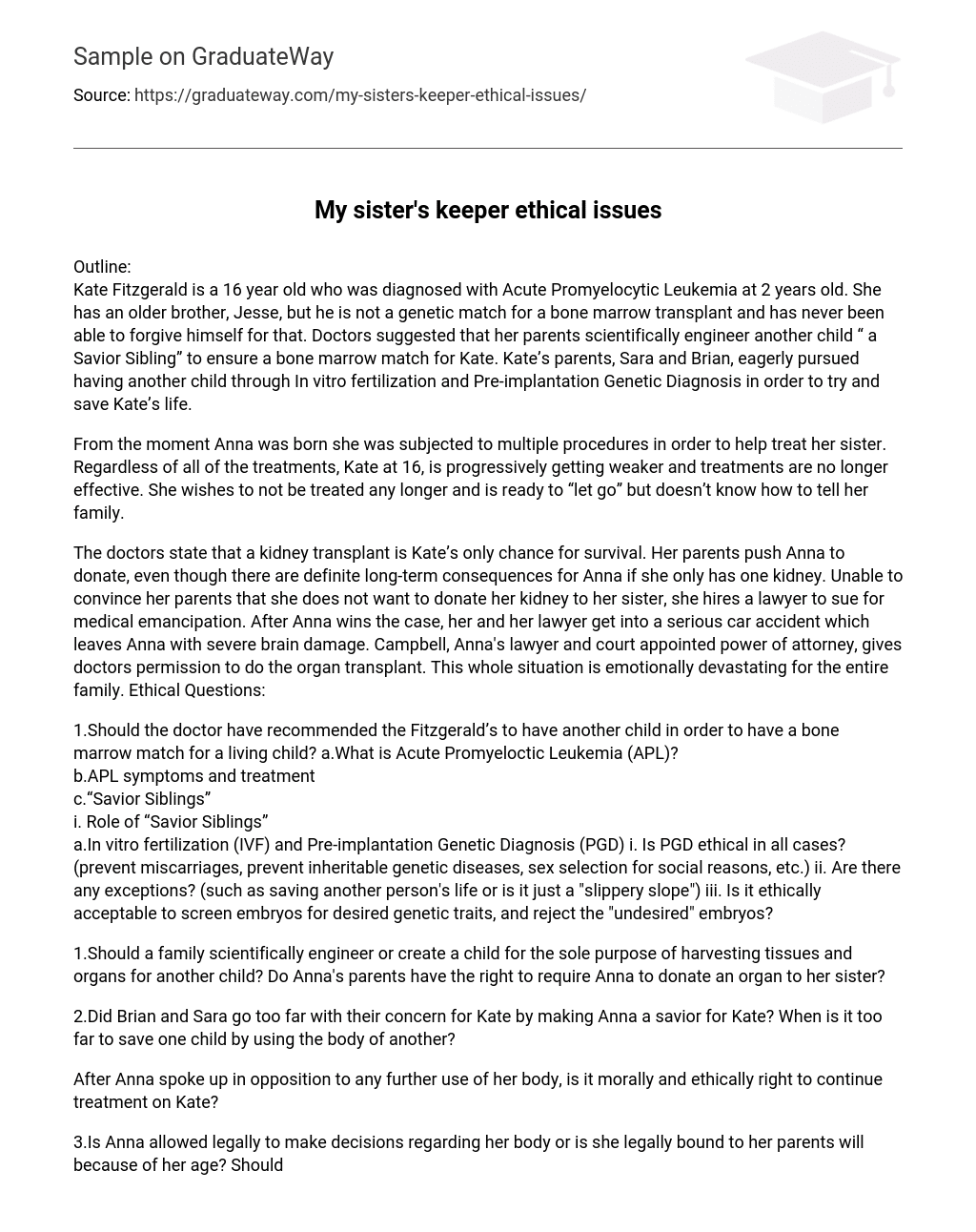Outline:
Kate Fitzgerald is a 16 year old who was diagnosed with Acute Promyelocytic Leukemia at 2 years old. She has an older brother, Jesse, but he is not a genetic match for a bone marrow transplant and has never been able to forgive himself for that. Doctors suggested that her parents scientifically engineer another child “ a Savior Sibling” to ensure a bone marrow match for Kate. Kate’s parents, Sara and Brian, eagerly pursued having another child through In vitro fertilization and Pre-implantation Genetic Diagnosis in order to try and save Kate’s life.
From the moment Anna was born she was subjected to multiple procedures in order to help treat her sister. Regardless of all of the treatments, Kate at 16, is progressively getting weaker and treatments are no longer effective. She wishes to not be treated any longer and is ready to “let go” but doesn’t know how to tell her family.
The doctors state that a kidney transplant is Kate’s only chance for survival. Her parents push Anna to donate, even though there are definite long-term consequences for Anna if she only has one kidney. Unable to convince her parents that she does not want to donate her kidney to her sister, she hires a lawyer to sue for medical emancipation. After Anna wins the case, her and her lawyer get into a serious car accident which leaves Anna with severe brain damage. Campbell, Anna’s lawyer and court appointed power of attorney, gives doctors permission to do the organ transplant. This whole situation is emotionally devastating for the entire family. Ethical Questions:
1.Should the doctor have recommended the Fitzgerald’s to have another child in order to have a bone marrow match for a living child? a.What is Acute Promyeloctic Leukemia (APL)?
b.APL symptoms and treatment
c.“Savior Siblings”
i. Role of “Savior Siblings”
a.In vitro fertilization (IVF) and Pre-implantation Genetic Diagnosis (PGD) i. Is PGD ethical in all cases? (prevent miscarriages, prevent inheritable genetic diseases, sex selection for social reasons, etc.) ii. Are there any exceptions? (such as saving another person’s life or is it just a “slippery slope”) iii. Is it ethically acceptable to screen embryos for desired genetic traits, and reject the “undesired” embryos?
1.Should a family scientifically engineer or create a child for the sole purpose of harvesting tissues and organs for another child? Do Anna’s parents have the right to require Anna to donate an organ to her sister?
2.Did Brian and Sara go too far with their concern for Kate by making Anna a savior for Kate? When is it too far to save one child by using the body of another?
After Anna spoke up in opposition to any further use of her body, is it morally and ethically right to continue treatment on Kate?
3.Is Anna allowed legally to make decisions regarding her body or is she legally bound to her parents will because of her age? Should Anna have any say in her participation in donating tissue/organs? Since Kate is dying and recovery seems hopeless, does she have the right to request the cessation of treatments? a.How does the knowledge that Anna was conceived to save Kate affect their perceptions of themselves, self-worth, and their relationship with each other? i. Will Kate feel guilty knowing that Anna was created to save her life? ii. What if Anna can’t save Kate? Will Anna face lifelong psychological damage?
iii. Does Anna feel objectified as a “spare parts baby”? Does Kate feel objectified as a sick person?
1.What are the clinically relevant and legal facts?
a. Has there been any other similar “Savior baby” cases?
1.What does the law say about a minor donating a kidney?
2.What are the health risks for Anna in continually giving bone marrow and tissues?
3.What are the chances for Kate’s survival and cancer remission if she continues to receive bone marrow and a kidney transplant from Anna? Has it been communicated to the parents what Kate’s survival rate is?
4.Is there any conflict of interest when the judge for Anna’s cases decides to appoint Julia as Anna’s guardian ad litem, and she has a romantic past with Campbell, Anna’s lawyer?
5.After the medical emancipation, the judge gave Campbell medical power of attorney of Anna, should it have been someone else?
6.Once the car accident happened and Anna had irreversible brain damage, was it right that Campbell told the doctors to give Anna’s kidney to Kate, though it was not her wish while she was alive?





